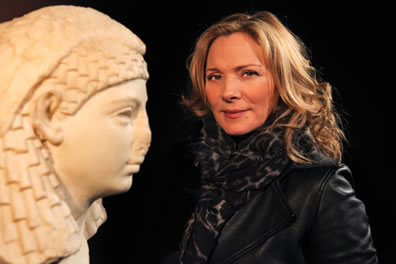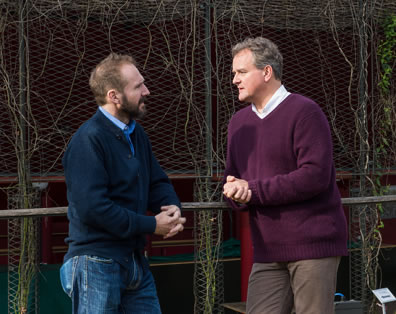Public Broadcasting Service
Shakespeare Uncovered Documentary Series
Returns for Season of Six New Episodes

Kim Cattrall with a bust of Cleopatra from an episode of Shakespeare Uncovered airing on PBS beginning Jan. 30. Photo by Richard Wyllie. Below, Hugh Bonneville, right, reunites with the actor he understudied for the role of Lysander, Ralph Feinnes, at Regent's Park Open Air Theatre. Photo by Andrea Southam.
The landmark Shakespearean documentary series Shakespeare Uncovered returns for a second season on PBS, beginning Friday, Jan. 30, at 9 p.m. (check local listings) and continuing the following two successive Fridays. This second set, like the first, will comprise six one-hour episodes combining history, biography, iconic performances, new analysis, and the personal passions of each episode's hosts—Hugh Bonneville, Kim Cattrall, Joseph Fiennes, Morgan Freeman, David Harewood, and Christopher Plummer—to tell the stories behind the stories of William Shakespeare's greatest plays.
The new season investigates A Midsummer Night's Dream, King Lear, Antony and Cleopatra, Romeo and Juliet, Othello, and The Taming of the Shrew. As before, the broadcasts will be accompanied by a rich Web site and community outreach.
Produced by Blakeway Productions, 116 Films, and THIRTEEN Productions LLC for WNET in association with PBS, Sky Arts, and Shakespeare's Globe, each episode reveals the extraordinary world and works of Shakespeare and the still-potent impact his plays have today. The films combine interviews with actors, directors, and scholars along with visits to key locations, clips from celebrated film and television adaptations, and illustrative excerpts from the plays staged especially for the series at Shakespeare's Globe in London.
Each of the six hosts has a personal connection with the play he or she presents. Plummer is one of the great Lears of our time; Cattrall has played Cleopatra twice on the English stage; Freeman has taken on The Taming of the Shrew's Petruchio at New York's Shakespeare in the Park; Harewood was the first black actor to play Othello at London's National Theatre; Joseph Fiennes portrayed Shakespeare playing Romeo in the Academy Award–winning movie Shakespeare in Love; and Bonneville began his career as an understudy in A Midsummer Night's Dream.
Shakespeare Uncovered reveals not just the elements in the play but the history of the play itself. What sparked the creation of each of these works? Where did Shakespeare get his plots, and what new forms of theater did he forge? What cultural, political and religious factors influenced his writing? How have the plays been staged and interpreted from Shakespeare's time to now? Why at different times has each play been so popular—or ignored? And finally, why has this body of work endured so thoroughly? What, in the end, makes Shakespeare so great?
The first season of this ambitious project explored Macbeth, Twelfth Night, As You Like It, Richard II, Henry IV and Henry V, Hamlet, and The Tempest, and was met with wide acclaim in both the U.K. and United States, including here on Shakespeareances.com (click here for review).
Here are synopses of the six new episodes:
- A Midsummer Night's Dream with Hugh Bonneville, Friday, Jan. 30, 2015, 9 p.m. Bonneville started his career at the Open Air Theatre in Regent's Park, understudying Ralph Fiennes as Lysander, one of the four lovers in A Midsummer Night's Dream. He and Fiennes meet up again to try to untangle the extraordinary plot of one of Shakespeare's most enduringly popular plays. Bonneville sees the play—on Midsummer's Night—at Shakespeare's Globe and talks with the Globe's Artistic Director Dominic Dromgoole about the play's delicate balance between comedy and tragedy, the natural and the supernatural. It is thought the play might have been performed as part of a wedding celebration, and the Globe actors try some of the scenes in the stately ruins of Copped Hall right next to the site of the original structure that may have been the play's original performance venue. We see clips of James Cagney's performance as Bottom in the 1935 film, the landmark Peter Brook production, and the BBC's 1980 production with Helen Mirren as Titania, and we hear from director Julie Taymor, who recently staged a production at the Theater for a New Audience in Brooklyn (starring David Harewood).
- King Lear with Christopher Plummer, Friday, Jan. 30, 2015, 10 p.m. Plummer played King Lear under the direction of Sir Jonathan Miller, who, we discover, has directed it six times. Lear was a real English king, who lived 800 years BC. Shakespeare's premise of Lear dividing his kingdom among his daughters and, in the process, disinheriting his favorite is, for the most part, supposedly true. The historic story has a happy ending, but Shakespeare gave his theatrical interpretation a dreadful dénouement that has been shocking audiences for 400 years. Ian McKellen and Simon Russell Beale share their insights into this often-difficult character, and Plummer examines what inspired Shakespeare to write a play about a kingdom divided when the new English king, James from Scotland, was trying to create what has become the "united kingdom." We learn how the storm scenes might have been produced at Shakespeare's own theater, and we see an alternate happy ending, written after Shakespeare's time, acted out at the Globe.
- The Taming of the Shrew with Morgan Freeman, Friday, Feb. 6, 2015, 9 p.m. Freeman first discovered Shakespeare in school in Mississippi. He went on to play Petruchio in The Public Theater's Shakespeare in the Park production in New York, set in the Wild West. Freeman notes that this play has set the template for all of the battle-of-the-sexes comedies that have followed; many a romantic comedy has The Taming of the Shrew running through its veins. We see some Petruchios who took on the "taming"—including Richard Burton, John Cleese, and Raul Julia—and such famous Kates as Elizabeth Taylor, Fiona Shaw, Sinead Cusack, and Meryl Streep. Freeman reunites with his own Kate, Tracey Ullman. Julia Stiles, star of the 1999 teen comedy adaptation, 10 Things I Hate about You, reflects on this contemporary version. And the Royal Shakespeare Company takes a version of the play to a school near where Shakespeare grew up, where viewers observe what children make of this very adult piece. The play may seem too brutal for modern audiences and ends with a speech about how women should obey their men. But is this the sexist propaganda that it first appears—or is there something more complicated going on? Freeman concludes that beneath the apparent cruelty is a message about equality in relationships, and we hear observations from many women who also admire the play, including pioneering feminist Germaine Greer (who appears as a commentator in several episodes).
- Othello with David Harewood, Friday, Feb. 6, 2015, 10 p.m. Harewood played Othello at London's National Theatre in 1997 and now returns to the play to see how the centuries have changed our views of it. Harewood learns about the Moorish ambassador who visited the court of Queen Elizabeth I and may have inspired Shakespeare. He meets the National Theatre's latest Othello, Adrian Lester, who has also starred in a play about Ira Aldridge, the 19th-century American actor who was the first black man ever to play the role in England; the reviews were shockingly racist. And he watches different Othellos on film, including Laurence Olivier's acclaimed if controversial "blacked-up" version from the 1960s. But Othello is as much about the great villain Iago as it is the Venetian general of the title, and a forensic psychiatrist helps to analyze this extraordinary psychopath and how he manipulates Othello by persuading him that his young wife is having an affair. Harewood meets Simon Russell Beale, who played Iago to his Othello, and they re-examine the lethal relationship. Imogen Stubbs and Sir Ian McKellen, who starred in Trevor Nunn's production; Julia Stiles, whose movie O was a modern take on the play; and Sir Patrick Stewart, who played Othello in a "color-reversed" production, also reflect on their characters.
 Antony & Cleopatra with Kim Cattrall, Friday, Feb. 13, 2015, 9 p.m. Cattrall has played Cleopatra twice. Now she explores the real character of the great queen of Egypt, and travels to Rome, ironically Marc Antony's city, in her quest to find out more about the historical Cleopatra. She also meets with her director, Dame Janet Suzman, who herself made an iconic Cleopatra at the Royal Shakespeare Company in 1973. Together they begin to uncover the truth behind this astonishing middle-aged love story. Antony and Cleopatra are no lovesick juveniles; they are mature, real, political figures. As such, they were quite dangerous roles to write, let alone to play. Cattrall watches different Cleopatras, meets Harriet Walter and Vanessa Redgrave (who have also played the role), and joins actors rehearsing the play at the Globe and watches them perform in the Globe's new candlelit indoor theater. Cleopatra is one of the greatest and largest of all Shakespeare's female roles, and must have required a boy actor of extraordinary skill. We look at the source Shakespeare used and how closely he copied the language of a Roman historian to describe Cleopatra's beauty; today he might be at risk for plagiarism. But comparing one of the most famous speeches in the play with its source, line by line, reveals the power of Shakespeare's poetry. Meanwhile, Richard Johnson and Patrick Stewart discuss playing Cleopatra's now-aging lover in the play.
Antony & Cleopatra with Kim Cattrall, Friday, Feb. 13, 2015, 9 p.m. Cattrall has played Cleopatra twice. Now she explores the real character of the great queen of Egypt, and travels to Rome, ironically Marc Antony's city, in her quest to find out more about the historical Cleopatra. She also meets with her director, Dame Janet Suzman, who herself made an iconic Cleopatra at the Royal Shakespeare Company in 1973. Together they begin to uncover the truth behind this astonishing middle-aged love story. Antony and Cleopatra are no lovesick juveniles; they are mature, real, political figures. As such, they were quite dangerous roles to write, let alone to play. Cattrall watches different Cleopatras, meets Harriet Walter and Vanessa Redgrave (who have also played the role), and joins actors rehearsing the play at the Globe and watches them perform in the Globe's new candlelit indoor theater. Cleopatra is one of the greatest and largest of all Shakespeare's female roles, and must have required a boy actor of extraordinary skill. We look at the source Shakespeare used and how closely he copied the language of a Roman historian to describe Cleopatra's beauty; today he might be at risk for plagiarism. But comparing one of the most famous speeches in the play with its source, line by line, reveals the power of Shakespeare's poetry. Meanwhile, Richard Johnson and Patrick Stewart discuss playing Cleopatra's now-aging lover in the play.
- Romeo and Juliet with Joseph Fiennes Friday, Feb. 13, 2015, 10 p.m. Fiennes has a unique perspective on Romeo and Juliet. He played Shakespeare—both writing and performing as Romeo—in the film Shakespeare in Love. Now he wants to examine why it remains the most-performed of all Shakespeare plays. Fiennes takes us back to the source, an Italian story translated into English when Shakespeare was a boy. Shakespeare adapted and dramatized the Italian poem, and other writers have been adapting him for centuries ever since. At London's Royal Ballet, viewers see the play in a famous dance interpretation, and later Stephen Sondheim discusses adapting for the Broadway musical theater as West Side Story. Fiennes visits adult night classes at a South London school where the participants can see their own lives reflected in the play. Orlando Bloom and Condola Rashad, who recently played the immortal lovers on Broadway in 2013, discuss the continuing power of the play and its poetry, and Fiennes looks at noted film adaptations, ranging from Franco Zeffirelli's 1968 Italian masterpiece to Baz Luhrman's contemporary re-imagining. We attend the premiere of a new film adaptation, this time rewritten by Julian Fellowes. Back at the Globe, we watch as the company rehearses a scene with a young man very effectively playing Juliet—just as would have been done in Shakespeare's time.
Shakespeare Uncovered is made possible by the National Endowment for the Humanities. Major funding is also provided by The Joseph & Robert Cornell Memorial Foundation, Dana and Virginia Randt, the LuEsther T. Mertz Charitable Trust, the Lillian Goldman Programming Endowment, The Polonsky Foundation, Rosalind P. Walter, Jody and John Arnhold, the Corinthian International Foundation,and PBS.
For Blakeway Productions, Richard Denton and Nicola Stockley are series producers, with Fiona Stourton as executive producer. For THIRTEEN, Bill O'Donnell is series producer, with David Horn as executive producer. Stephen Segaller is executive in charge.
January 7, 2015
If you have Shakespearean news to share, e-mail editorial@shakespeareances.com



